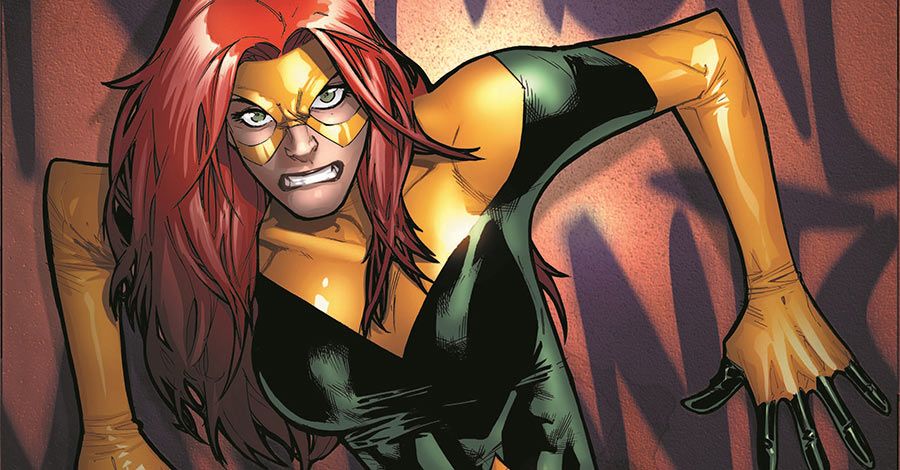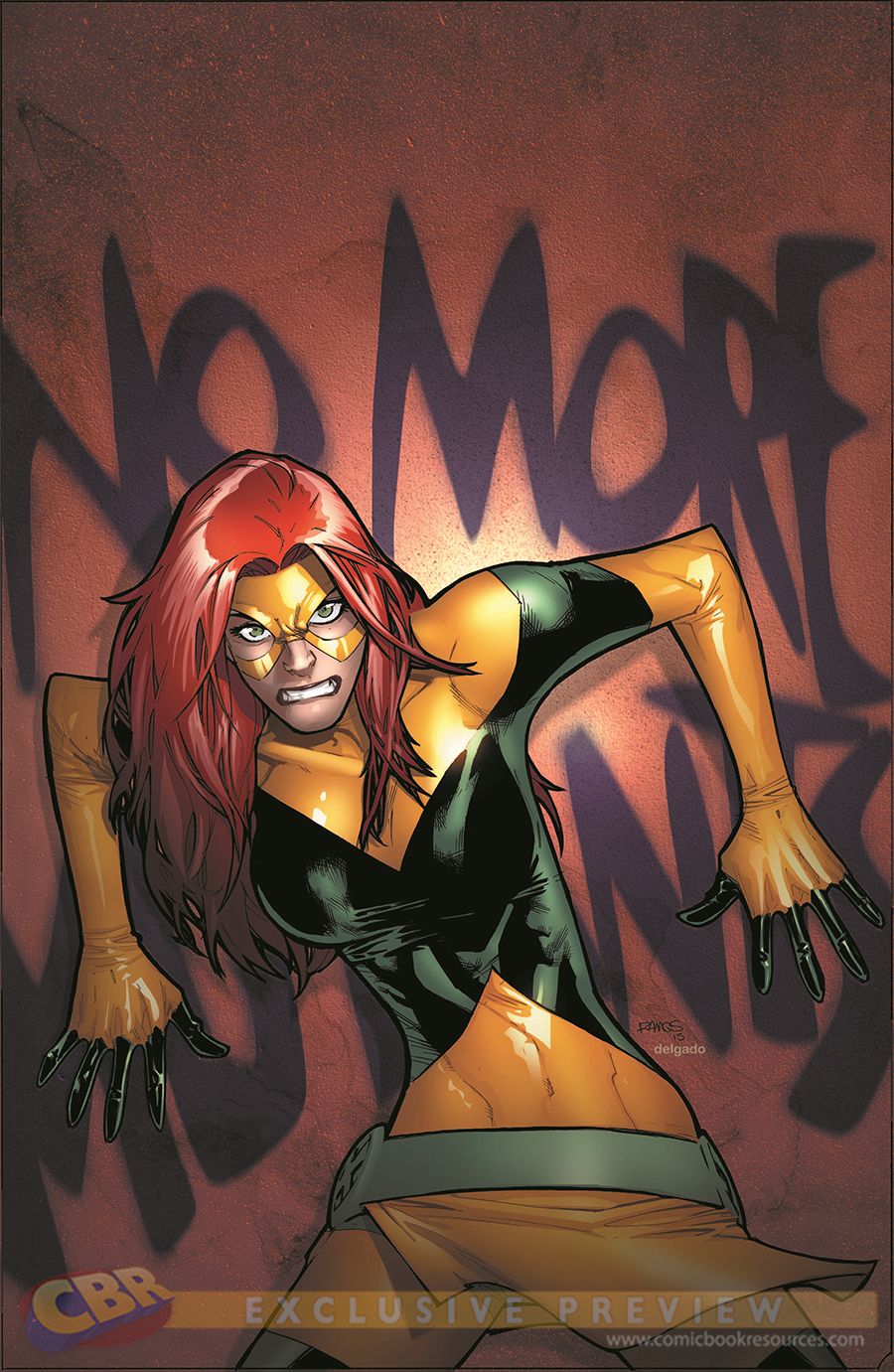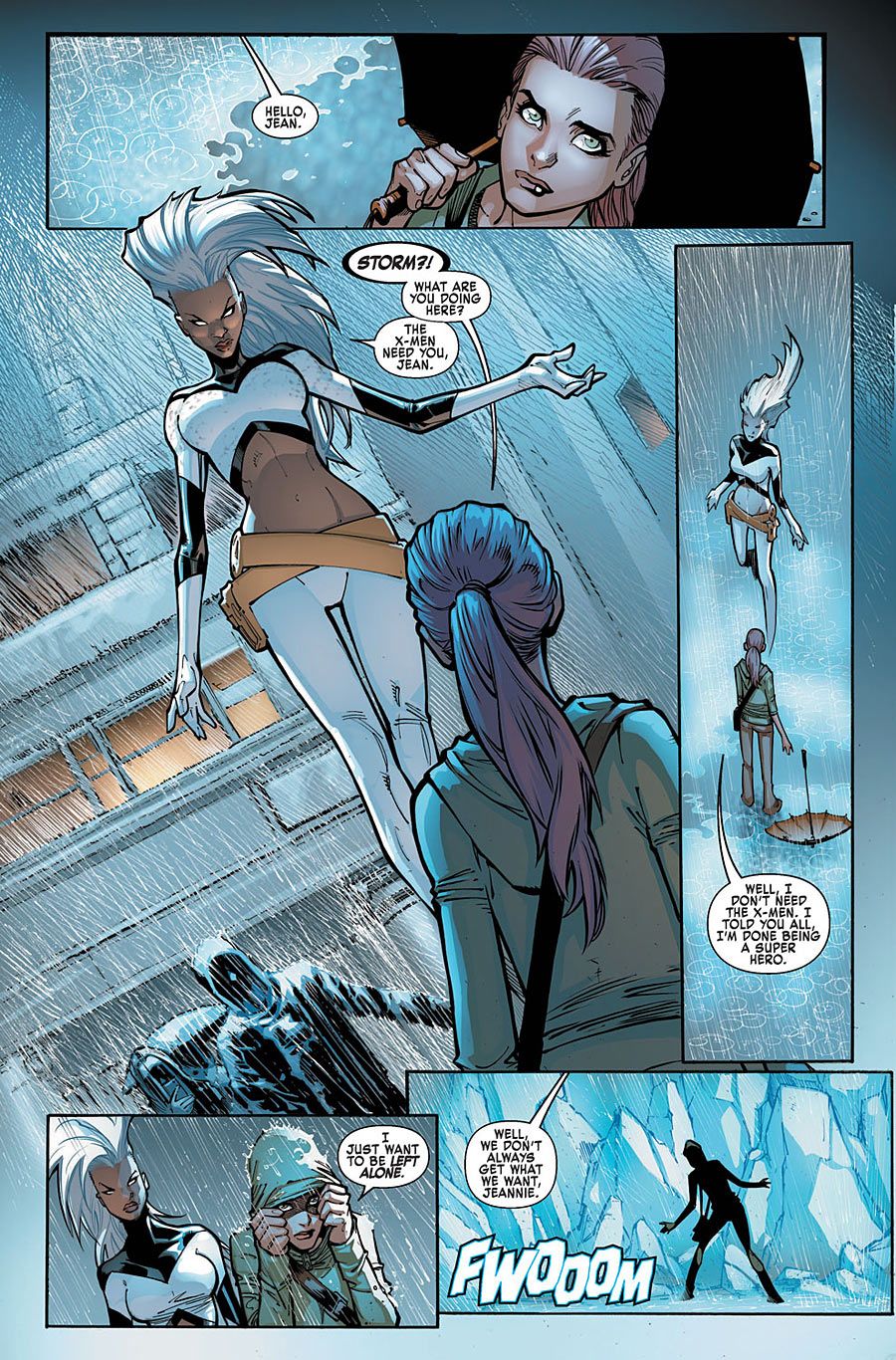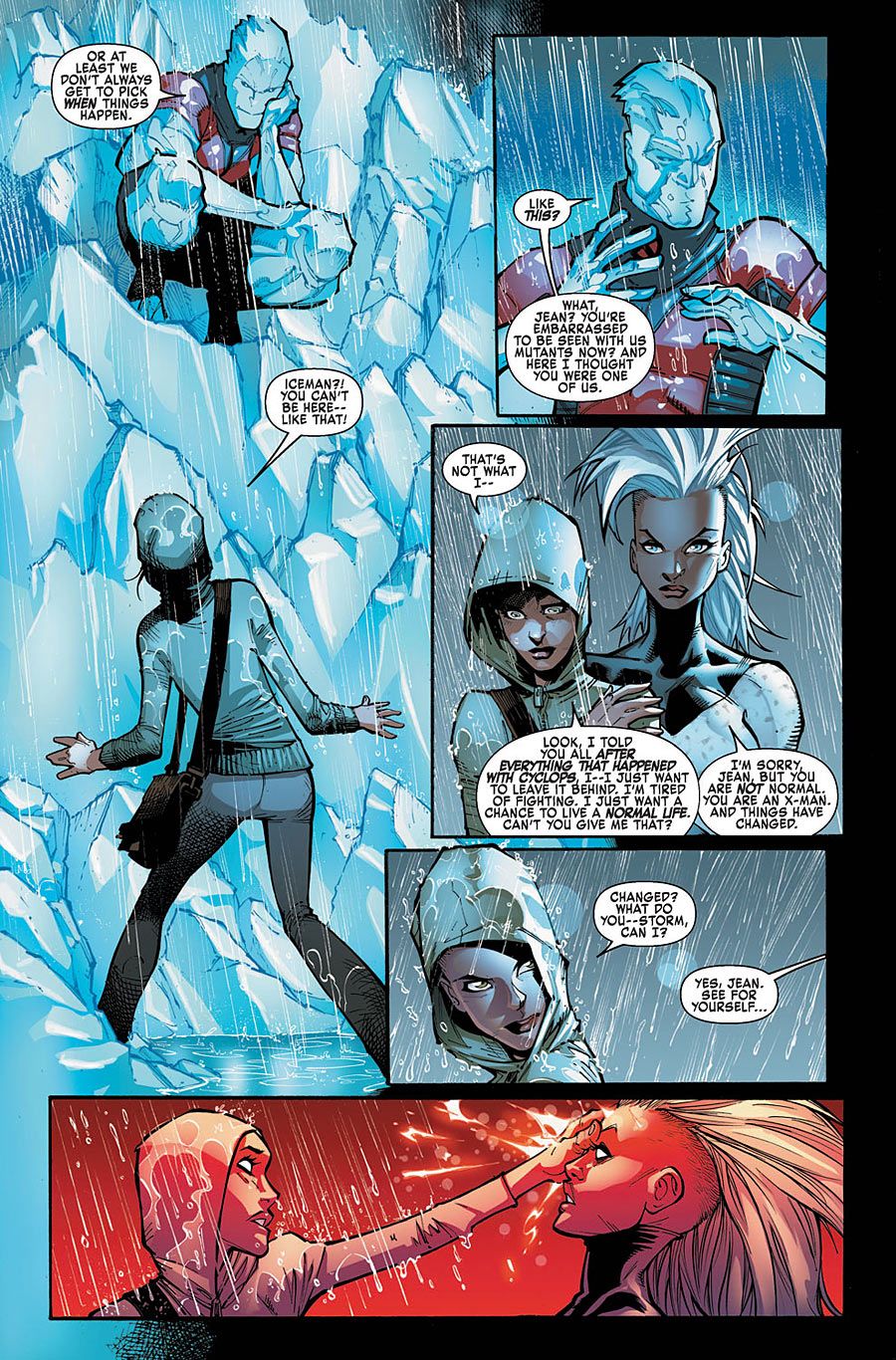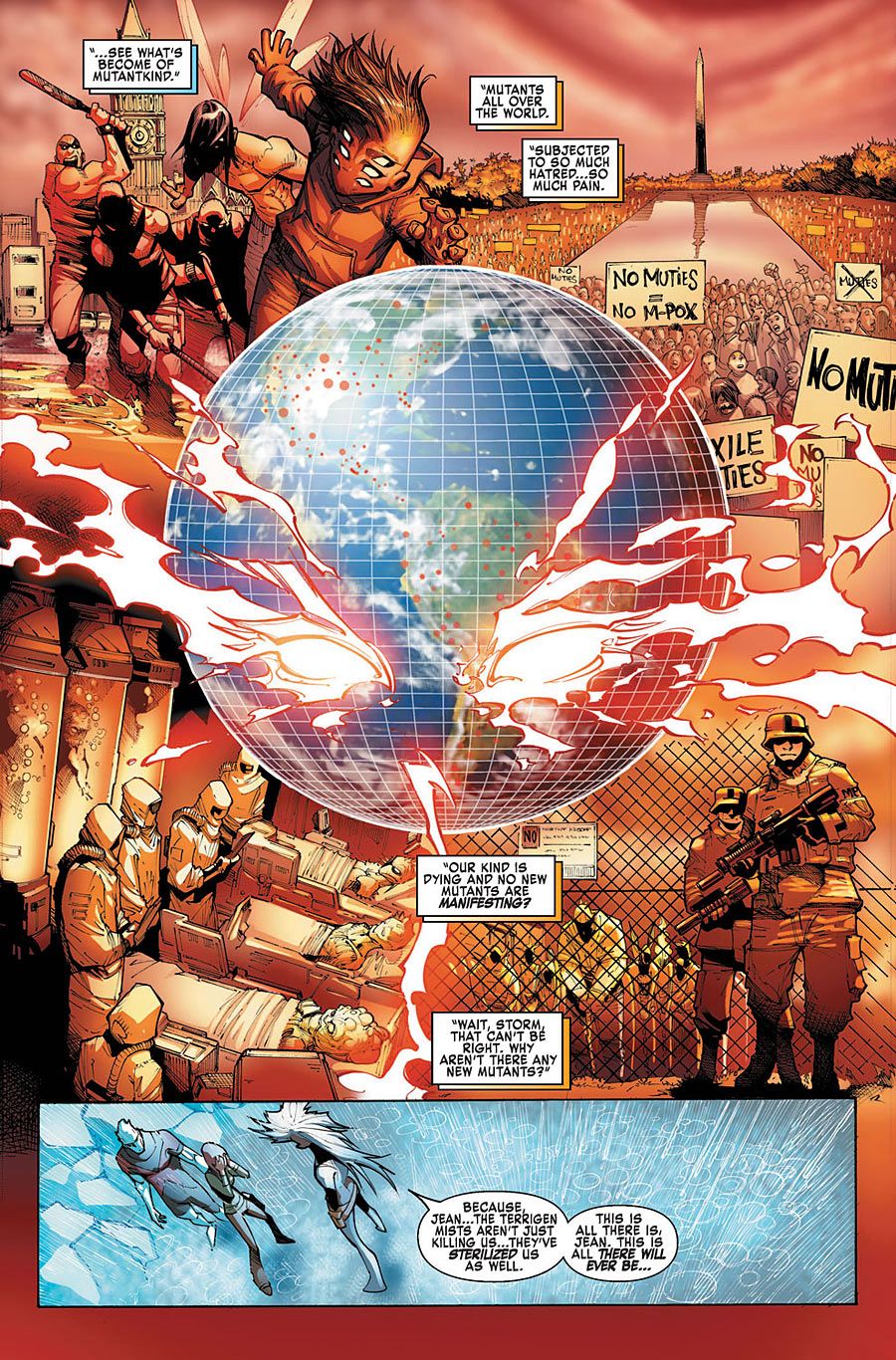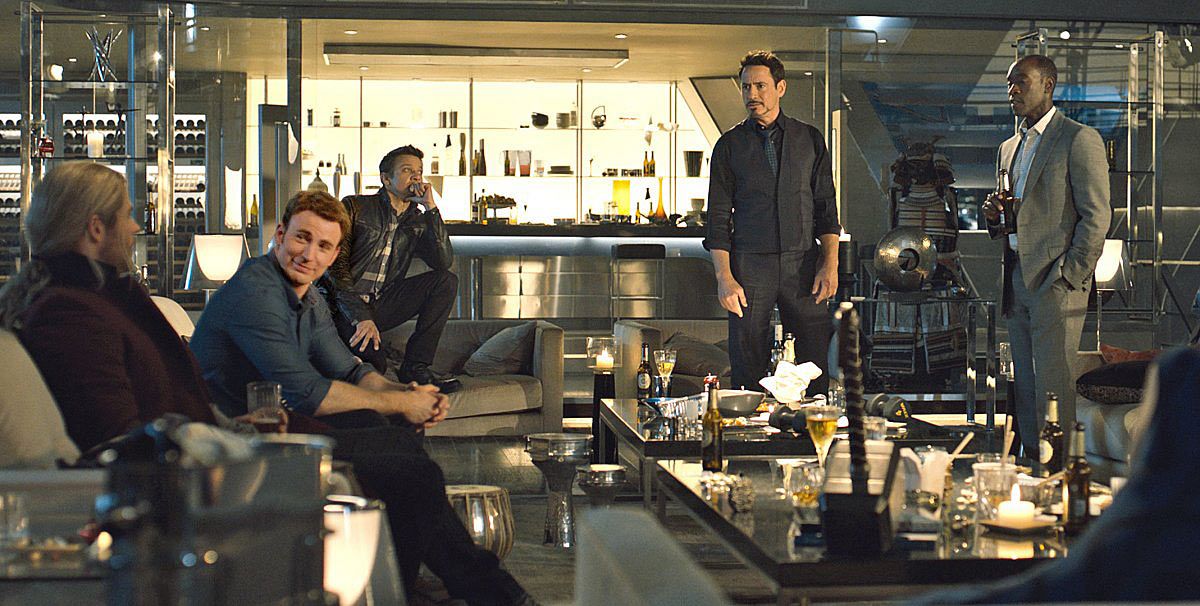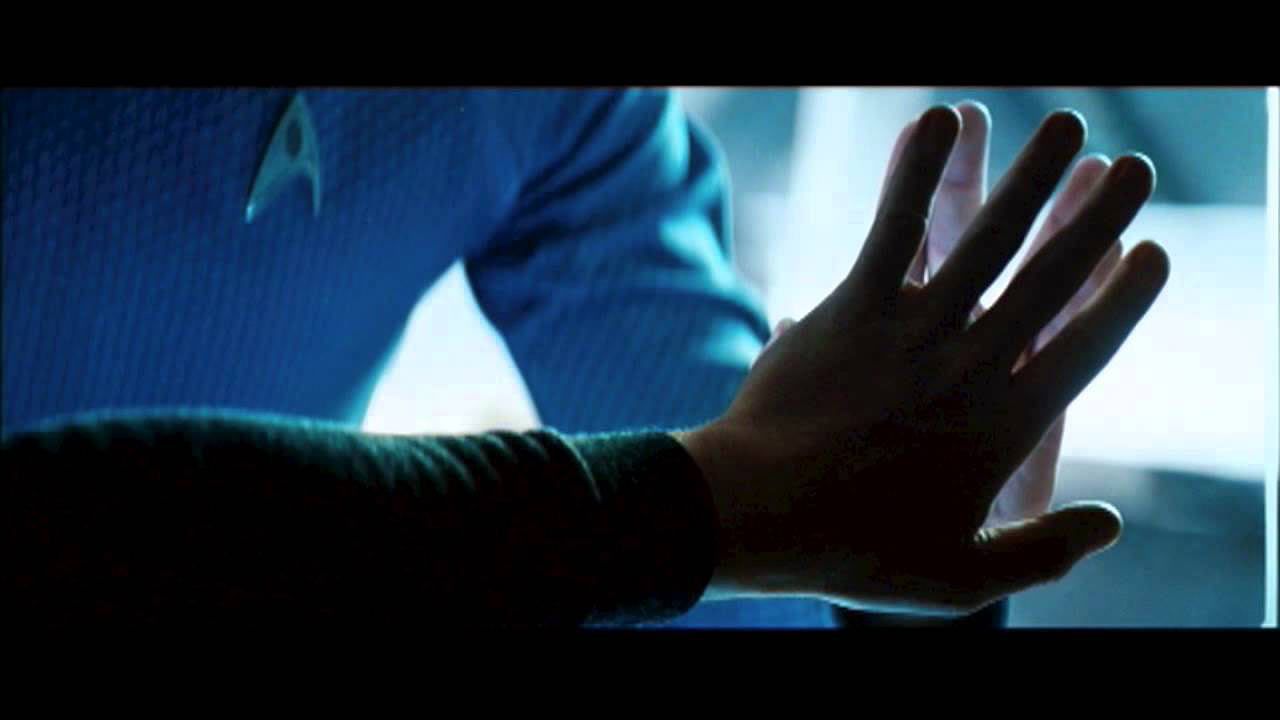Let me just get this out of the way first: I'm stupid excited for Jeff Lemire and Humberto Ramos' "Extraordinary X-Men." One of the things I'm most proud of during my time so far with CBR is the announcement interview for the series that I got to conduct with Lemire back in late June. Being the first interviewer to talk to Lemire about it meant a lot to me -- a fact that wouldn't surprise anyone that could see the X-Shrine where I'm writing this article; whoever's spying on me right now can spot a dozen representations of Storm around me. Heck, in the interview with Lemire, you can plainly see that his answer about how much he loves the X-Men gets me choked up. I'm an easy mark when it comes to the mutants (one could say I have an...X... on my forehead), but that doesn't make my excitement about "Extraordinary X-Men" any less genuine.
I say all this as preface to this article, where it might sound at first like I'm harping on a series that hasn't even been released yet. Marvel released some preview pages for the first issue and they drop a mighty big plot point -- one that Lemire teased in that interview but remained hush hush about.
The release of Terrigen Mist into the atmosphere has apparently made members of the mutant population ill and has rendered all mutants sterile. Yep, we're back in "No More Mutants" territory again.
Now, I could write another article about the seemingly diminished role of the X-Men at Marvel, or bring up that with seven ongoing series solicited for release in December, the X-Men comics line is the smallest its been in around 25 years. These are, admittedly, what Marvel calls conspiracy theory thoughts -- but it's hard not to think that Marvel is engaging in some masterful trolling by publishing a story wherein an Inhuman mist is killing off mutants for readers convinced that Marvel is in reality replacing the X-Men with the Inhumans. I honestly can't be legitimately mad at a plot development as hilariously on-the-nose as this one. I'm game for it.
But no, all that stuff from the previous paragraph is actually representative of the status quo I now accept -- and I'm fine with it. What gave me pause was the fact that we're doing "mutants are dying out" again exactly three years and one week after that storyline was resolved in "Avengers vs. X-Men" #12. We had three years of mutant population growth after almost exactly seven long years spent in the "no more mutants" era set in motion by "House of M." Looking at those pages, I couldn't believe we were back to this story again, so soon after it was resolved. I'm also now wondering what it is about October that makes mutants fair game for major status quo shifts.
That initial ping of disappointment didn't last long, though, and I soon came back to my senses. You see, as tired as I got of the "no more mutants" jam (and oh oh oh oh man did I get tired of it), I'm not up for wasting emotional energy on being disappointed by its return. More importantly, I like being excited about things. I remembered that superhero comics reuse plot lines all the time. Why get mad or disappointed by a comic doing what comics do -- especially when those pages also feature gorgeous Humberto Ramos art and Lemire writing Storm, Iceman and teen Jean? That's more than enough to be happy about!
This could be sacrilegious, it could draw some ire from fans/peers, and it definitely reveals why I usually shy away from doing actual formal reviews of things -- but plot is not the most important thing to me. Granted, I don't want a plot to have frustratingly large holes that overwhelmingly distract me while I'm interacting with the story (looking at you, "Prometheus"), but the enjoyment I get out of movies mostly comes from characters. Characters that I love and am interested in can cause me to not only overlook, but completely not see plot failings. Oops?
And this goes way back; the first time my tinier, younger brain encountered the word "plot" was in disses hurled at movies I liked. "It has no plot" or "unoriginal plot" were complaints I'd see; I distinctly remember being young enough to not know what a plot was, but I knew that apparently some of my favorite things had none of it. Characters and their interactions have always grabbed my attention way more than plot; that's a me thing, and I think it's very much a me thing, and it's one reason I have some of the unpopular-ish opinions I do about movies.
For example, I'll get honest about two of this year's biggest movies: "Avengers: Age of Ultron" and "Furious 7." Both movies have tons of characters, overly complex plots and ridiculous amounts of action -- but I enjoyed "Age of Ultron" to a ridiculous degree more than "Furious 7." I think both films went on for a bit too long and featured at-times-meandering plots, although neither of those things were dealbreakers for me. But here's why I love "Age of Ultron" and am downright perplexed by people turned off by the film solely for plot reasons: those characters. Those actors playing those characters, I could watch that all damn day. I feel like I know each and every one of them, I get their relationships and personalities crystal clear, and the way Joss Whedon has them all interact with each other -- that banter -- just delights me endlessly.
I thoroughly enjoy the "Fast & Furious" movies a lot and will see every one of them in the theater and extol the virtues of them to any action movie fan that is somehow not a convert -- but I cannot tell you the difference between Vin Diesel or Dwayne Johnson's characters. Jordana Brewster's wife character is criminally underdeveloped. Michelle Rodriguez had amnesia for... two movies, but she seemed mostly okay... aside from some confused looks? I know that Tyrese Gibson is funny (like Michelangelo) and Ludacris is funny and does machines (like Donatello). You can tell how little I have retained about the humans in these movies by how I referred to them by the actor names. My main -- actually my only -- problem with the "Fast" franchise is that I cannot latch onto anything regarding the characters; fortunately the action scenes in those movies are relentless and fantastic so, I love them.
But my innate plot-blindness really came into play with "Star Trek Into Darkness." I wrote last week about how J.J. Abrams is a director that presents stories on the screen in a way my very visual brain cannot deny. I know I was apparently supposed to be a mix of livid and eye-roll-y while watching "Into Darkness," but that just didn't happen either time I saw it; I loved it. I had a blast. I laughed, I gasped, I had a great time -- because I love those actors in those roles (I also have no deep attachment to "Star Trek" as a franchise, so that is probably key to my take).
To get back on the "Extraordinary X-Men" track, I get that "Into Darkness" spent all of its third act doing a "Wrath of Khan" retread. I got that while I was watching it, too, because, well, duh -- but I still loved it! Can't help it! My brain wasn't repulsed; it was super intrigued by how Abrams was re-interpreting all those moments. Side note: Do not tweet me to tell me how wrong I am; I'm fully aware of literally every single shortcoming of this movie, let's talk about anything else.
The same "Into Darkness"/"Wrath of Khan" plot remix is all over the X-Men, too -- it's as engrained in their DNA as the X-gene. And that's all right. Grant Morrison borrowed heavily from "The Dark Phoenix Saga" and "Days of Future Past" in his run, spinning those story elements and plot points -- along with plenty of new ideas -- into a thoroughly Grant Morrison affair.
Joss Whedon's run, which I personally prefer over Morrison's, is even more guilty of this. I noticed while I was reading his first "Astonishing X-Men" arc, "Gifted," that the cure storyline had already been done twice before -- once in the '90s Fox cartoon and again a couple years later during Steven T. Seagle's run on "Uncanny." And what did he follow that story up with? "Danger," which saw the Danger Room regain its sentience and attack the X-Men. Just six years earlier, "The Hunt for Xavier" storyline did the exact same thing, except with another piece of iconic X-tech -- Cerebro.
It doesn't stop there; "Age of Apocalypse" is like "Days of Future Past" run amok, and "DOFP" has inspired at least a dozen direct sequels. Magneto gets hold of nuclear weapons so often that it might as well be his secondary mutation. How many times has Professor X gained and lost the ability to walk, and exactly what is the status of Warren Worthington's codename and wings this month? Stories are retold, plots are redone, reset buttons are hit, retcons are enacted -- this is the world of superhero comics, and to expect these stories, which are expected to last for decades, to behave any differently is kinda dumb.
What matters is the story itself and the artists telling them. I loved Whedon's run because I enjoyed seeing his style redo those plots. And to be honest, the fallout from "House of M" is maybe my least favorite period for the X-Men line in the past decade; I thoroughly welcome a writer I love like Jeff Lemire taking a crack at that. Because seriously, "Sweet Tooth" and "Trillium" and "Descender"? Those are books I loved (or love, in the case of "Descender"). Lemire has an incredibly unique voice, one that brought me to near tears when I heard how much it loved the X-Men. I can't wait to read more of his Iceman and Storm -- I can't wait to see Humberto Ramos' Nightcrawler in action. And while this one story element is familiar, it's going to be in the mix with things only specifically Lemire and Ramos can cook up. I'm excited to see what these creators do with these characters, because that's something I've definitely never seen before.
Brett White is a writer and comedian living in New York City. He made videos for the Upright Citizens Brigade as a member of UCB1 and writes for the podcast Left Handed Radio. His opinions can be consumed in bite-sized morsels on Twitter (@brettwhite).

